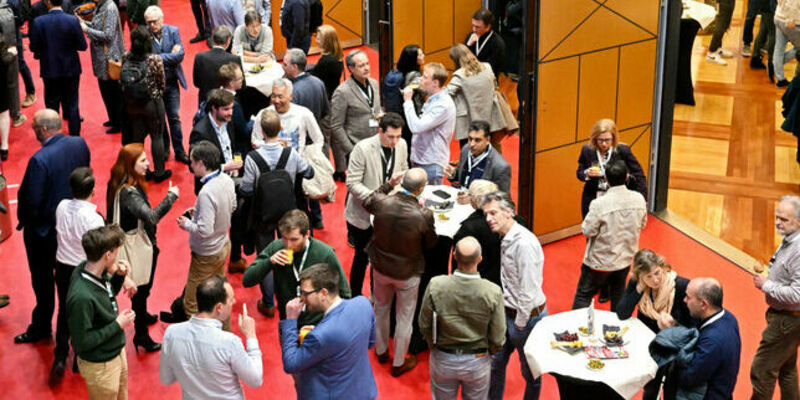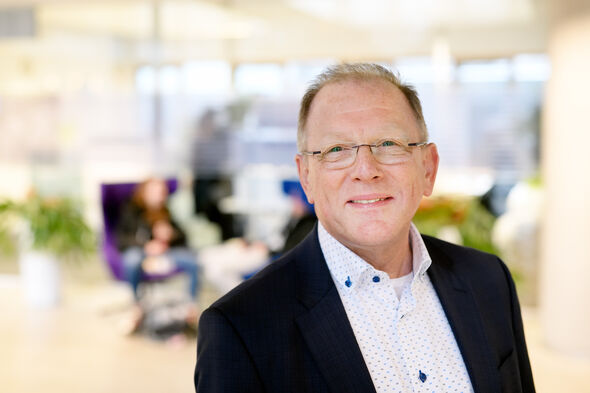
- The University , Research
- 31/05/2023
UFe Impact Night informs and tries to stimulate
Emeritus professor and former dean Ton Backx believes that University Fund Eindhoven (UFe) still has much potential for growth. There is no reason why the fund’s current size of approximately 3 million euros couldn’t grow to 30 million euros over time, Backx says. During its first ever Impact Night, on June 28th, UFe will offer donors insight into how their donations have been put to use so far. But Backx hopes that other alumni will also feel stimulated that day to start offering projects support on a structural basis.
Ton Backx retired from TU/e in early 2020. At the time, he told Cursor that he planned to talk with the university’s Executive Board about an advisory or auxiliary position, because the former dean of Electrical Engineering didn’t feel like spending his time sitting at home just yet. The UFe ambassadorship is one of the functions he decided to accept. Backx considers it a nice mission to try and persuade alumni to donate to projects by TU/e scientists whose applications were rejected by regular funding bodies such as NWO.
Backx: “Many scientists in the Netherlands, including several here at TU/e, write research proposals, but only a handful of these proposals receive funding. As a result, many interesting and innovative projects remain unrealized. These are the projects and researchers that we want to give a financial boost with funding from UFe.”
Themes
The decision was made to take a thematic approach. “It turns out that our alumni tend to prefer to put their donations to use in a targeted way. This has led to the establishment of two thematic funds, the Energy Tech Fund and the Health Tech Fund, and perhaps of several more in the long term, for example in the field of artificial intelligence, photonics or mobility. We’re still thinking about that. Preferably a field in which several research groups are involved.”
Backx says that young researchers in particular can benefit from additional funding. “They don’t have an established reputation or extensive network yet, things that make it easier to receive funding from NWO or Brussels.” Reputable TU/e scientists look for projects that are covered by both thematic funds, Backx says. These scientists also asses which of these projects ultimately deserve funding from UFe. “The setup is that a researcher who wishes to become eligible for funding, submits a compact proposal. We don’t want that person to have to draft one of those extensive NWO proposals again. We search within the entire university, because the assessors have a broad network. This way, we think that we will have covered everything successfully.”
Next, it is determined what precisely is needed, Backx says. “Roughly speaking, UFe’s co-financing amounts to a donation of approximately four hundred thousand euros per research proposal. Researchers are free to shape their own research and to appoint a PhD candidate or postdoc if they wish to do so.” Naturally, a research project needs to have value, Backx says, “but if it doesn’t yield the expected result, that’s okay too. Conducting research is a matter of trial and error, and if the result isn’t what you expected, that too is an answer.”
Initiatives
UFe Impact Night, which will take place in Flux on June 28th, is mostly intended to show donors how their money was put to use. However, Backx hopes that the event will help persuade alumni who haven’t donated yet, but who are considering it, to do so after all.
He says that roughly five major donors currently donate some four to five hundred thousand euros spread out over a period of five years. “That number can definitely still grow, as far as I’m concerned. An evening like this can contribute to that, just like the Startup Night and Innovation Night, which we’ve organized in the past. You can give people a tour of the labs, and hope that something starts to stir inside them and that they become excited and decide to join, and that they’ll share that enthusiasm within their networks.”
The former dean says that he is glad with every donor who decides to join UFe, and that people should donate whatever amount they see fit. Nevertheless, he makes no secret of his ambition when asked how much growth potential the fund has. With a broad smile: “A size of thirty million, why wouldn’t that be realistic in the long term?”
What else does UFe offer?
Boris and Axel fund
This fund supports TU/e students in developing or testing their innovative projects and research in the fields of sports, sustainability, and inclusivity. It was founded in February of this year by the parents of Boris Bakker and Axel Verstegen. An annual amount of up to €10,000 is available. You can apply at any time. Every second and third week of each quarter a committee evaluates the applications.
More information: Boris and Axel fund
Student and study associations
UFe stimulates numerous activities, of various kinds. Activities such as excursions, sporting events, concerts, study trips and symposia. These events are organized for and by students and contribute to the university’s image.
More information: Student and study associations
Socially relevant internships and student teams
UFe is keen to contribute to a broad talent development of students. Do you make a difference with your project? Does your project contribute to helping people live safer, more sustainable and healthier lives?
More information: Socially relevant internships and student teams

Discussion